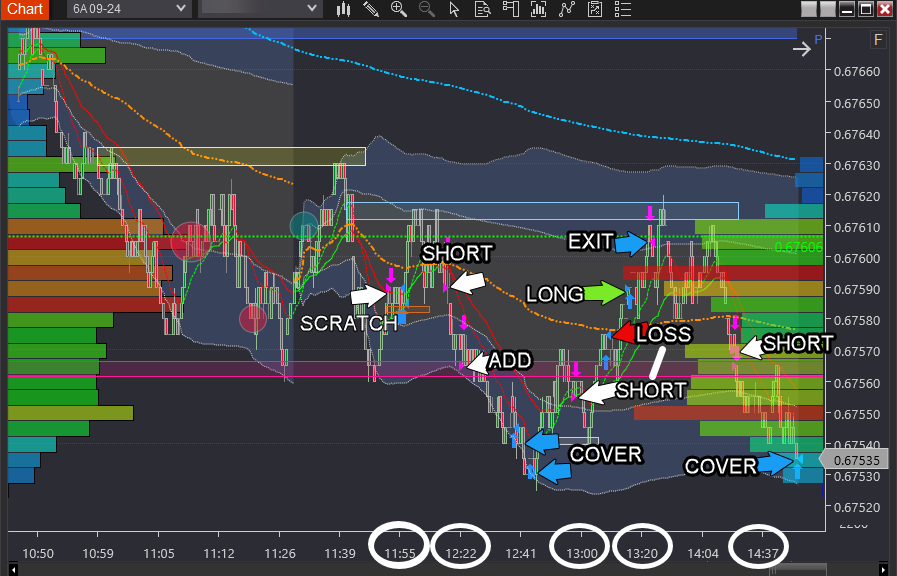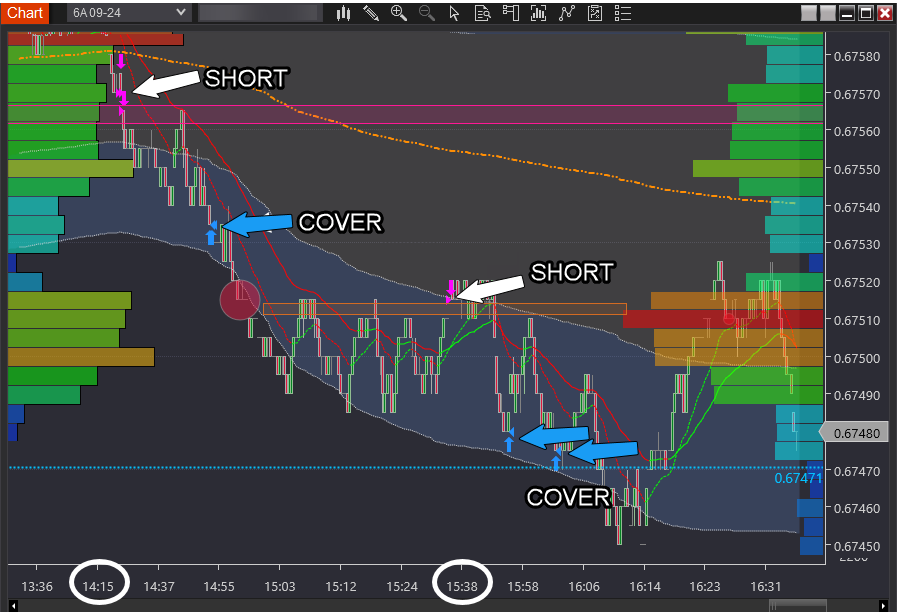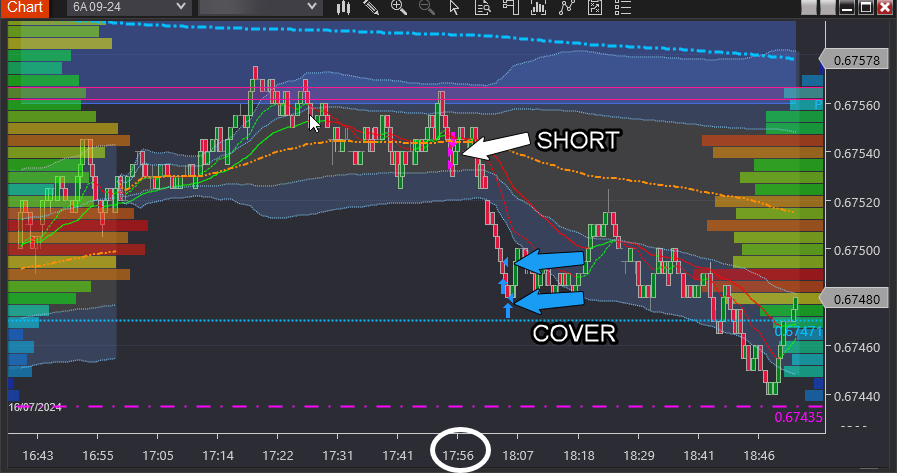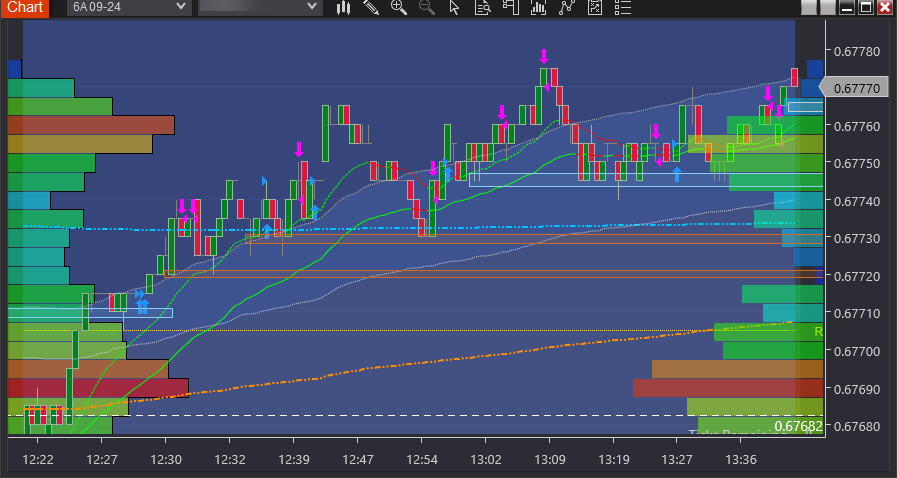No is normal
No, this time your trade won't work.
No, the price isn't going to continue going your way.
No, just because you were right moments ago, it’s no longer the case.
And until you:
-
Believe this at a deep level, and.
-
Arm yourself with the skills to make pinpoint entries, despite these 'No's,
You'll forever be an emotional ticking time bomb, with reactional trades ready to explode.
Now keep reading to find out why it happens and how to overcome it—with real trading from this week to demonstrate.
While my edges are not made public, I'll make one exception and share one of the most significant:
Outlasting the competition. But what does it mean?
To illustrate: What happens at the start of a marathon?
Everyone is running at roughly the same pace. Even the casual runner can keep pace with a world title-holding marathon runner in the early phase of the race.
But over time, the strongest athletes break away from the pack. And you'll see the same behaviours in the market.
Why?
You know the market functions to take money from the pack to pass to the strongest traders.
But it's not something the pack does by choice. The market needs to intervene to force their hand, right?
During this intervention, the best-intentioned traders fall victim to their lack of market understanding and skill.
You'll see real trading to demonstrate this in a minute. But first, remember what the best trader of our time, Jim Simons, said about trading?
"We don't want to predict price, but we want to predict when other market participants are going to do something."
Jim Simons is referring to game theory.
I bolded the word "game" because, unlike a regular marathon, the separation of the leaders from the pack is anything but regular when it comes to trading.
It can happen sooner or later, for longer or for shorter, or partially or completely—that's the nature of a competitive game.
And you never know beforehand what it is going to be like 'this time'.
This shows why it's vital to your trading success to know how—using a swimming term—to 'tread water'. Trades that don't take you forward but don't sink you either.
To enter trades that go your way yet take the money that's available before the trade fails to continue, as if the trade worked 'kind of'.
And to know when you can enter and use the market's money to add to your position and take more out of the market on the rare occasion this opportunity occurs.
And to rinse and repeat.
You'll see examples of all of these scenarios demonstrated below.
Tuesday's trading:
Eight trades were made between midday and six in the evening. With an hour spent in the planning stage before trading—this is a typical trading day.
The best plans allow you to double, triple, and quadruple dip—but only if you have the skills to enter and exit with precision—to ensure you turn the 'No's' we covered earlier into opportunities.
With the exception of one long scalp, all trades were acting out the same daily game plan—trade short between 0.6760 and 0.6747.
Excerpt from Friday's trading Below you see what treading water looks like.
Neither going forward nor backwards.
This is the essence of outlasting the competition.
You don't know when, but eventually, the trade that pays presents itself.
But you must be trading to take advantage—regardless of how long you spend treading water beforehand. Make sense?
Yet because treading water trading is challenging, while you might not see movement in your account balance, it advances your skills.
What happens next?
Treading water trading prepares you to extract maximum payment from the market when the trade that pays comes. It makes you a much better trader.
See treading water: Blue arrows are buys, and pink arrows are exits.
Forex and derivatives trading is a highly competitive and often extremely fast-paced environment. It only rewards individuals who attain the required level of skill and expertise to compete. Past performance is not indicative of future results. There is a substantial risk of loss to unskilled and inexperienced players. The high degree of leverage can work against you as well as for you. Before deciding to trade any such leveraged products you should carefully consider your investment objectives, level of experience, and risk appetite. The possibility exists that you could sustain a loss of some or all of your initial investment and therefore you should not invest money that you cannot afford to lose. You should be aware of all the risks associated with trading on margin, and seek advice from an independent
Editors’ Picks

EUR/USD: US Dollar to remain pressured until uncertainty fog dissipates Premium
The EUR/USD pair lost additional ground in the first week of February, settling at around 1.1820. The reversal lost momentum after the pair peaked at 1.2082 in January, its highest since mid-2021.

Gold: Volatility persists in commodity space Premium
After losing more than 8% to end the previous week, Gold (XAU/USD) remained under heavy selling pressure on Monday and dropped toward $4,400. Although XAU/USD staged a decisive rebound afterward, it failed to stabilize above $5,000.

GBP/USD: Pound Sterling tests key support ahead of a big week Premium
The Pound Sterling (GBP) changed course against the US Dollar (USD), with GBP/USD giving up nearly 200 pips in a dramatic correction.

Bitcoin: The worst may be behind us
Bitcoin (BTC) price recovers slightly, trading at $65,000 at the time of writing on Friday, after reaching a low of $60,000 during the early Asian trading session. The Crypto King remained under pressure so far this week, posting three consecutive weeks of losses exceeding 30%.

Three scenarios for Japanese Yen ahead of snap election Premium
The latest polls point to a dominant win for the ruling bloc at the upcoming Japanese snap election. The larger Sanae Takaichi’s mandate, the more investors fear faster implementation of tax cuts and spending plans.
RECOMMENDED LESSONS
Making money in forex is easy if you know how the bankers trade!
I’m often mystified in my educational forex articles why so many traders struggle to make consistent money out of forex trading. The answer has more to do with what they don’t know than what they do know. After working in investment banks for 20 years many of which were as a Chief trader its second knowledge how to extract cash out of the market.
5 Forex News Events You Need To Know
In the fast moving world of currency markets where huge moves can seemingly come from nowhere, it is extremely important for new traders to learn about the various economic indicators and forex news events and releases that shape the markets. Indeed, quickly getting a handle on which data to look out for, what it means, and how to trade it can see new traders quickly become far more profitable and sets up the road to long term success.
Top 10 Chart Patterns Every Trader Should Know
Chart patterns are one of the most effective trading tools for a trader. They are pure price-action, and form on the basis of underlying buying and selling pressure. Chart patterns have a proven track-record, and traders use them to identify continuation or reversal signals, to open positions and identify price targets.
7 Ways to Avoid Forex Scams
The forex industry is recently seeing more and more scams. Here are 7 ways to avoid losing your money in such scams: Forex scams are becoming frequent. Michael Greenberg reports on luxurious expenses, including a submarine bought from the money taken from forex traders. Here’s another report of a forex fraud. So, how can we avoid falling in such forex scams?
What Are the 10 Fatal Mistakes Traders Make
Trading is exciting. Trading is hard. Trading is extremely hard. Some say that it takes more than 10,000 hours to master. Others believe that trading is the way to quick riches. They might be both wrong. What is important to know that no matter how experienced you are, mistakes will be part of the trading process.
The challenge: Timing the market and trader psychology
Successful trading often comes down to timing – entering and exiting trades at the right moments. Yet timing the market is notoriously difficult, largely because human psychology can derail even the best plans. Two powerful emotions in particular – fear and greed – tend to drive trading decisions off course.






